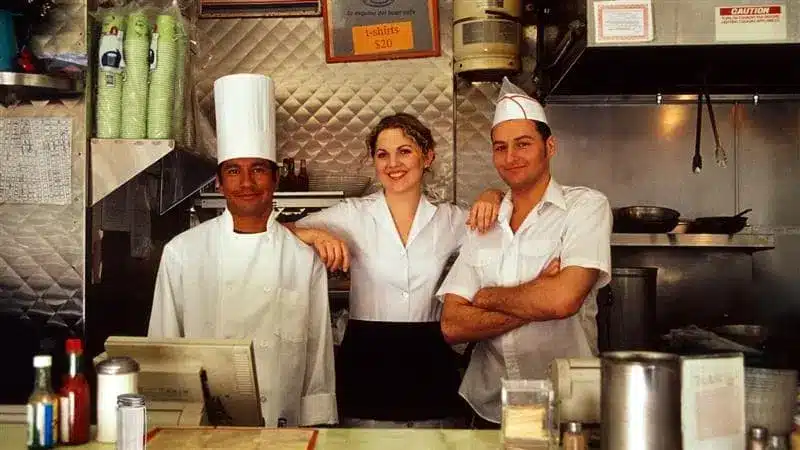
7 Alarming Ways Immigration Impacts Food Industry Jobs
- The Hidden Crisis Behind NYC’s Food Industry
- Labor Shortages Are Straining the Food Workforce
- Immigration Crackdowns Are Disrupting the Supply Chain
- Food Prices Are Rising Across the Industry
- Quality and Food Safety Are at Risk
- Restaurant Service and Morale Are Declining
- Innovation Is Slowing Across the Food Industry
- The Entire Community Feels the Ripple Effects
- How NYC Businesses Can Stay Resilient
- NYC-Specific Trend: Local Sourcing on the Rise
- Protecting People Protects the Food Industry
The Hidden Crisis Behind NYC’s Food Industry
If you work in restaurants, catering, or the food industry, you’ve probably felt the pressure lately, delayed produce deliveries, higher food costs, or trouble finding reliable staff. These challenges aren’t just random. They’re symptoms of a larger disruption in food industry jobs, fueled by ongoing immigration crackdowns across farms, factories, and kitchens.
In this article, I’ll explain seven major ways immigration policies are affecting NYC’s food businesses, from produce sourcing to customer service. You’ll see how these shifts are reshaping the entire supply chain, what it means for your business, and what you can do to stay resilient.
1. Labor Shortages Are Straining the Food Workforce
Walk into any restaurant, hotel kitchen, or food warehouse in New York right now, and you’ll hear the same thing: We can’t find enough people to work.
Immigrants make up nearly one in five food industry jobs in the U.S. from agriculture and food production to delivery and hospitality. When deportation fears rise, fewer people show up for work. That shortage affects every step of the process: crops go unharvested, distribution slows, and restaurants can’t meet demand.
Without enough workers, owners end up taking on multiple positions, pushing through 70-hour weeks just to keep up. This isn’t just exhausting, it’s unsustainable. NYC’s fast-paced environment needs stability to thrive, and labor uncertainty makes that impossible.
2. Immigration Crackdowns Are Disrupting the Supply Chain
When immigrant labor drops, the supply chain team feels it immediately. From farmhands in New York to truck drivers and warehouse associates, every role counts. Deportation crackdowns and inspections at farms and distributors have slowed shipments of Seasonal Produce like citrus, greens, and herbs.
That delay reaches your kitchen fast. You may have noticed fresh items arriving late or not at all. Restaurants that depend on consistent wholesale produce supply are forced to pay more or change menus midweek.
Example: One NYC café I work with recently cut its brunch menu because avocado shipments were late three weeks in a row, a direct result of West Coast labor gaps. Even small disruptions can impact profit margins and customer satisfaction when your company runs on perishable products.
3. Food Prices Are Rising Across the Industry
When farms and processors lose workers, output drops. Fewer hands mean fewer harvests, pushing prices up. From citrus to lettuce, the wholesale produce market has become volatile.
These rising costs are hard to absorb for restaurants, bakeries, and hotels. A family-owned company can’t always pass those costs on to diners without losing business. Meanwhile, suppliers face higher fuel, labor, and handling expenses.
Higher prices affect your customers, too. As inflation meets supply strain, NYC diners are cutting back, forcing restaurants to fight harder for every order.
4. Quality and Food Safety Are at Risk
Food safety relies on trained, consistent staff. When immigration changes create turnover, experience leaves with it. Untrained replacements can struggle to maintain food safety standards, especially in busy kitchens or processing facilities.
Inconsistent staff also affects quality. Fresh produce that isn’t handled or stored correctly can lose flavor, texture, and nutrients. That means chefs spend more time inspecting ingredients instead of cooking with confidence.
To stay compliant, every food industry business needs to double down on sanitation training, clear checklists, and accountability, especially when handling perishables.
5. Restaurant Service and Morale Are Declining

Beyond the kitchen, the immigration issue hits front-of-house teams. Many NYC restaurants, hotels, and coffee shops depend on immigrant workers who bring reliability, skill, and warmth to customer-facing roles.
When those employees fear deportation or leave the city, service suffers. Fewer team members means slower turnaround times and stressed staff. That drop in morale ripples into the guest experience, and in hospitality, performance and attitude matter as much as food.
The solution? Support your team openly. Build a workplace culture rooted in respect, fairness, and stability. It keeps good people loyal, even in uncertain times.
6. Innovation Is Slowing Across the Food Industry
When you’re short-staffed, creativity takes a back seat. Chefs and managers spend their days putting out fires instead of planning the next trend. Across NYC, food industry jobs that once sparked innovation are now focused on basic survival, filling shifts, and meeting orders.
This has slowed product development, menu testing, and sustainability initiatives. Without a strong workforce, innovation stalls, and the industry loses momentum.
To stay ahead, I’ve encouraged our supply chain team to focus on efficiency projects, automating scheduling, optimizing routes, and investing in training, so your clients still get fresh, consistent service even when staffing is tight.
7. The Entire Community Feels the Ripple Effects
Immigrants aren’t just employees, they’re part of the community. They rent homes, buy groceries, and send their kids to local schools. When deportations increase, neighborhoods lose stability. That loss hurts businesses, tax revenue, and even the availability of local food options.
In New York City, immigrant workers make up a vital share of the labor force, especially in food service, hospitality, and wholesale distribution. According to data from the New York State Comptroller, nearly one in four food industry jobs in the city is held by an immigrant.
When that workforce shrinks, the effects ripple through every neighborhood, from the Bronx’s produce markets to Manhattan’s fine dining restaurants. The result? Slower deliveries, shorter menus, and a food economy that struggles to keep up with demand.
How NYC Businesses Can Stay Resilient
If you’re part of the city’s food industry, you can’t control federal policy, but you can adapt. Here are a few steps I’ve seen work:
- Partner locally. Build relationships with wholesale produce suppliers who prioritize sustainability and worker fairness.
- Cross-train your staff. Give every employee the ability to cover more than one position, it builds flexibility.
- Focus on retention. Treat your team well. Offer consistent hours, benefits, and fair pay. Loyalty saves more than turnover costs.
- Stay prepared. Keep emergency suppliers on file and plan for delivery delays, especially during peak week periods.
- Communicate openly. Your staff and clients appreciate transparency during uncertain times.
These steps won’t solve immigration policy overnight, but they’ll help your company protect its workforce and maintain its mission of delivering great food responsibly.
NYC-Specific Trend: Local Sourcing on the Rise
As labor uncertainty grows, more NYC restaurants are turning to Seasonal Produce and local farms to fill gaps. Working with nearby growers means shorter supply chains, faster delivery, and stronger community support.
At Valley View Produce, our dedicated team partners with regional farmers to keep wholesale produce supply steady year-round. We understand the urgency of running a kitchen in a fast-paced environment, and we deliver solutions that reduce waste, support local jobs, and ensure quality.
If you want reliable fresh ingredients that arrive on time, local partnerships are your best defense against global disruptions.
Protecting People Protects the Food Industry
Immigration challenges are more than a political issue, they’re a people issue. Every role in the food industry matters, from harvesters to sales reps to delivery drivers. When one part of that system is shaken, the entire table wobbles.
As leaders, we have a choice: to react, or to create stability. Supporting our workers, sourcing responsibly, and partnering with trusted wholesale produce suppliers helps keep the industry, and our community, strong.
Partner with a Produce Supplier Who Understands the Industry
At Valley View Produce, we believe that behind every ingredient is a person, and every successful restaurant needs both. If you’re ready to strengthen your supply chain, improve consistency, and work with a partner who shares your values, we’d love to help.
Join our network of NYC chefs, restaurants, and food businesses today.
Let’s keep the city’s kitchens running with integrity, passion, and the freshest produce possible.